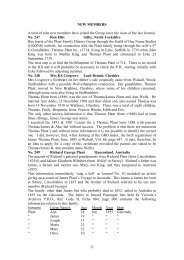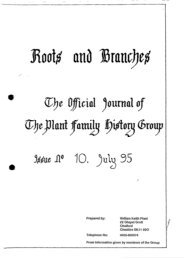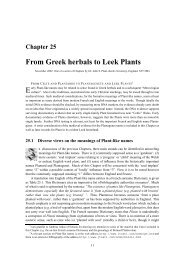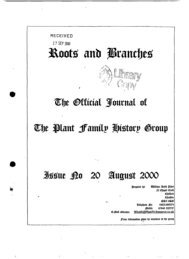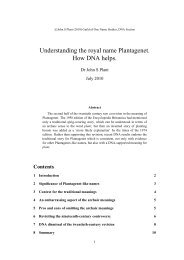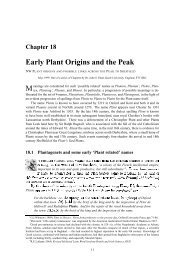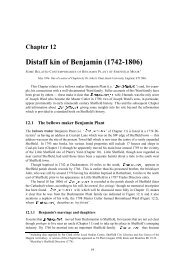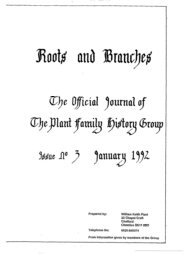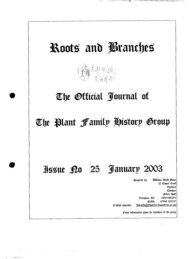Chapter 34 Austin Plant - Plant Family History Group
Chapter 34 Austin Plant - Plant Family History Group
Chapter 34 Austin Plant - Plant Family History Group
You also want an ePaper? Increase the reach of your titles
YUMPU automatically turns print PDFs into web optimized ePapers that Google loves.
This latter paper illustrates how a DNA study can lead on to important implications. The Y-DNA<br />
results presented in my first Nomina paper, together with other evidence, had suggested a generative<br />
meaning (offspring) for the <strong>Plant</strong> surname and this, in turn, lends weight to a metaphysical<br />
reappraisal of the royal <strong>Plant</strong>agenet name.<br />
Though eprint servers on the web began in 1991, this was just for academic papers on Theoretical<br />
High Energy Particle Physics. Such servers are rarer for Humanities subjects – the only Humanities<br />
eprint server so far is the cogprints server for the Cognitive Sciences which was launched in<br />
1997. In the Natural Sciences, such as Physics, it is becoming quite usual to make a paper available<br />
on the web even before it has been accepted for publication by the Journal referees. However, this<br />
practice is still frowned upon in the Humanities. It is hence no surprise that the editor of Nomina<br />
has asked me not to publish my second paper on the web until after paper copies of Volume 30 of<br />
Nomina have been circulated to their Society’s subscribers. In this connection, it is important to<br />
note that Nomina hold the copyright of the articles published in their journals even after they have<br />
appeared on the web on an eprints server.<br />
The subject of my second Nomina paper is, as its title suggests, mainly about the <strong>Plant</strong>agenets.<br />
Its final appendix, however, is about the <strong>Plant</strong> name and I am reproducing this below with the appropriate<br />
copyright notice. This Appendix summarises information that I have previously published<br />
in Roots and Branches with the addition of a few further points.<br />
Appendix D. Cultural context of the <strong>Plant</strong> surname — This Appendix is repro-<br />
duced on the understanding that its Copyright belongs to Nomina 30.<br />
An unwelcome influence on the <strong>Plant</strong>agenet name can be associated with the Welsh Marches where<br />
the word planta meant ‘to procreate’. Here, there is the English surname <strong>Plant</strong> (3756 phonebook<br />
entries in the UK) an understanding of which has recently been enlightened by Y-DNA findings 103 .<br />
These indicate that modern <strong>Plant</strong>s have a single-ancestor, rather than a multi-origin, surname.<br />
Though some family branches with early ‘<strong>Plant</strong>-like’ name spellings may have died out, much<br />
of the medieval evidence for the formative <strong>Plant</strong> surname might represent the travels of a single<br />
family.<br />
In the nineteenth century it was claimed that <strong>Plant</strong> was a corruption of <strong>Plant</strong>agenet 104 but there<br />
are other, less presumptuous possibilities. Though the <strong>Plant</strong> blazon indicates illegitimate cadetship,<br />
it is not clear to whom. Illegitimacy, however, can provide an explanation of why the Welsh meaning<br />
‘offspring’ of plant 105 could have been sufficiently noteworthy for its use as a surname. In Iowerth’s<br />
thirteenth-century codification of Welsh law, a bastard was treated equally with a legitimate child 106<br />
though that was not the case in Canon law. The <strong>Plant</strong> name could have purported to status in Wales<br />
though a bastard had no automatic right to inheritance or a father’s surname in England 107 .<br />
Though exaggerated claims of a <strong>Plant</strong>agenet connection should be debunked, it is possible that<br />
there was some cultural influence from the <strong>Plant</strong>agenet name to sustain the <strong>Plant</strong> surname’s attraction.<br />
This could have been through the diminutives <strong>Plant</strong>eng’ and <strong>Plant</strong>yn and a wider Welsh<br />
definition of plant: to wit ‘follower’ or ‘servant’. Roger <strong>Plant</strong>eng’ or <strong>Plant</strong>yn (1254-68) was<br />
103 J.S. <strong>Plant</strong> (2005) Modern methods and a controversial surname: <strong>Plant</strong>, Nomina, 28, pp. 115-33, esp. p. 119.<br />
104 M.A. Lower, A Dictionary of <strong>Family</strong> Names of the United Kingdom, (London and Lewes, 1860), p. 185. J. Sleigh, A<br />
<strong>History</strong> of the Ancient Parish of Leek, (Leek and London, 1862), p. 33.<br />
105 The Geiriadur Prifysgol Cymru, ibid, defines plant 1 as: children, young persons; children (of parents), offspring<br />
(sometimes of animals), progeny, issue; descendants; followers, disciples, servants; persons regarded as product of a<br />
particular place, time, event, circumstances, etc.; ?boys, sons; also fig.<br />
106 D. Jenkins, Property interests in the classical Welsh law of women in D. Jenkins and M.E. Owen (ed) The Welsh law<br />
of women: studies presented to Professor David A. Binchy on his eightieth birthday, 3 June 1980, (University of Wales,<br />
1980), p. 51.<br />
107 Blackstone’s Commentaries of the Laws of England, Vol. I, ed. W. Morrison (London, 2001) pp. 352-53 states, ‘Yet<br />
he [a bastard] may gain a surname by reputation [Co. Litt. 3] though he has none by inheritance. All other children have<br />
a settlement in their father’s parish; but a bastard in the parish where born, for he has no father [Salk. 427]. ... A bastard<br />
may, lastly, be made legitimate, and capable of inheriting, by the transcendent power of an act of parliament, and not<br />
otherwise [4 Inst. 36]: as was done in the case of John of Gant’s bastard children, by a statute of Richard the second’.<br />
58



